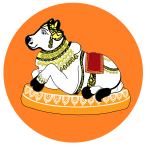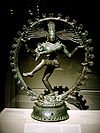List of Shiva temples in India
This article needs additional citations for verification. (May 2015) |
| Part of a series on |
| Shaivism |
|---|
 |
|
|
Shiva is a Hindu deity. As one of the Trimurti (supreme trinity) in the Hindu pantheon among Brahma and Vishnu, there are a number of temples dedicated to his worship in India and abroad. In Hinduism, Shiva is the supreme being regarded to perform the functions of creation, preservation, as well as the destruction of the universe.[1] Hindu texts describe the worship of Shiva and the establishment of temples and shrines throughout the Indian subcontinent, commonly in the aniconic form of a lingam. The most prominent of these are the Jyotirlinga temples.[2]
The 12 Jyotirlinga temples
[edit]The 12 Jyotirlinga temples as mentioned in the Shiva Purana are :-[3]
Pancha Bhuta Sthalams (Five Elemental Manifestations)
[edit]In South India, five temples of Shiva are held to be particularly important, as being manifestations of him in the five elemental substances.
| Deity | Manifestation | Location | ||
|---|---|---|---|---|
| Jambukeswarar |  |
Water | Thiruvanaikaval, Tamil Nadu | |
| Arunachaleswarar |  |
Fire | Tiruvannamalai, Tamil Nadu | |
| Kalahastheeswarar | Air | Srikalahasti, Andhra Pradesh | ||
| Ekambareswarar |  |
Earth | Kanchipuram, Tamil Nadu | |
| Natarajar |  |
Sky | Chidambaram, Tamil Nadu | |
Pancharama temples
[edit]The Pancharama Kshetras (or the Pancharamas) are five ancient Hindu temples of Shiva situated in Andhra Pradesh. The lingams at these temples are made from a single lingam. As per the legend, this lingam was owned by the demon king Tarakasura. No one could win over him due to the power of this lingam. Finally, Kartikeya, the son of Shiva broke the lingam into five pieces and killed Tarakasura. The five pieces of lingam fell at five different places on earth namely,

| Arama Name | Shiva's Name | Consort Name | Location |
|---|---|---|---|
| Amararama | Amaralingeswara Swamy | Bala Chamundika Ammavaru | Amaravathi village, Andhra Pradesh |
| Draksharama | Bhimesvara Swamy | Manikyamba Ammavaru | Draksharama, Andhra Pradesh |
| Somarama | Someswara Swamy | Sri Rajarajeswari Ammavaru | Bhimavaram, Andhra Pradesh |
| Ksheerarama | Ksheera Ramalingeswara Swamy | Parvati Ammavaru | Palakollu, Andhra Pradesh |
| Bhimarama | Kumara Bhimeswara Swamy | Bala Tripurasundari Ammavaru | Samalkota, Andhra Pradesh |
Pancha Sabhai
[edit]The five temples located in Tamil Nadu where Shiva is believed to perform the tandava dance are:
| Sabha | Temple | Location |
|---|---|---|
| Pon (Gold) Sabha | Natarajar Temple | Chidambaram |
| Velli (Silver) Sabha | Meenakshi Temple | Madurai |
| Thamira (Copper) Sabha | Nellaiappar Temple | Tirunelveli |
| Rathna (Gem) Sabha | Sri Vadaranyeswarar Temple | Thiruvalangadu |
| Chitira (Picture) Sabha | Kutraleeswar Temple | Kutralam |
Ashta Veeratta Temples
[edit]| Temple | Deity | Commemorates | Location |
|---|---|---|---|
| Veerateeswarar Temple, Thirukovilur | Veerateeswarar | Shiva slaying Andhakasura in the form of Andhakasuramurti | Tirukoilur |
| Veerateeswarar Temple, Thiruvathigai | Veerateeswarar | Shiva killing Tripurasura and destroying the three cities in the form of Tripurantaka | Panruti |
| Veerateeswarar Temple, Korukkai | Veerateeswarar | Shiva burning Kamadeva with his third eye in the form of Kamari | Mayiladuthurai |
| Kandeeswarar Temple, Kandiyur | Brahmasirakandeeswarar | Shiva decapitating the fifth head of Brahma in the form of Bhairava | Thanjavur |
| Amritaghateswarar-Abirami Temple, Thirukkadaiyur | Amritaghateswarar | Shiva defeating Yama and blessing Markandeya to remain a youth of 16 in the form of Kalantaka | Thirukkadaiyur |
| Veerateeswarar Temple, Thirupariyalur | Veerateeswarar | Shiva beheading Daksha and destroyed Daksha Yajna in the form of Virabhadra | Mayiladuthurai |
| Veerateeswarar Temple, Vazhuvur | Veerateeswarar | Shiva killing Gajasura in the form of Gajasurasamhara | Mayiladuthurai |
| Veerateeswarar Temple, Thiruvirkudi | Veerateeswarar | Shiva killing Jalandhara in the form of Jalandharari | Mayiladuthurai |
Shani Parihara Temples
[edit]| Sabha | Temple | Location |
|---|---|---|
| Sani Parihara Sthalam | Tirunallar Saniswaran Temple | Thirunallaru, Puducherry |
| Sani Parihara Sthalam | Sri Darbarneeswarar Temple | Devasthanam |
| Shani Parihara | Chenchadainathar Shiva Temple | Sayalkudi, Tamil Nadu |
| Shani Parihara | Sri Mandeswara Swamy Vari Devasthanam | East Godavari, Andhra Pradesh|- |
Kashiswar Jiu temple
[edit]
Kashiswar Jiu temple is in Andul of Howrah district near the Saraswati river, West Bengal in India. The presiding deity is a Banlinga which was recovered from the river in mid 17th century by Kashiswar Datta Chowdhury, a local zamindar. In 18th century a stone made yoni-like structure (Gauripatta) that symbolizes goddess Shakti has been attached with the lingam after Bargi attacked in 1741 AD. The deity is considered to be one of the oldest in the district.
| Deities | Year |
|---|---|
| Biseshwara | 1785 AD |
| Nakuleshwara | 19th century circa |
| Saurendra Mohaneshwara | 18th century circa |
The temples are presently run by SrisriKashiswar Debottur Trust.
Notable temples
[edit]Andhra Pradesh
[edit]Assam
[edit]Bihar
[edit]- Kapileshwar Temple, Rahika
- Parasmaninath Temple, Madhubani
- Ugna Mahadev Temple, Bhawanipur
- Kalyaneshwar Mahadev Mandir
- Gandiveshwar Sthan
- Dakshineswar Nath Mahadev Mandir
- Khudneshwar Asthan Morwa, Morwa
Chhattisgarh
[edit]Goa
[edit]Gujarat
[edit]Jammu and Kashmir
[edit]Karnataka
[edit]Kerala
[edit]- Aluva Mahadeva Temple
- Chengannur Mahadeva Temple, Chengannur
- Chowalloor Siva Temple,Guruvayoor
- Elannummel Shiva Temple
- Ernakulam Shiva Temple, Ernakulam
- Ettumanoor Mahadevar Temple, Ettumanoor
- Jagannath Temple, Thalassery
- Kolathukara Shiva Temple
- Kottiyoor Temple, Kottiyoor
- Mammiyoor Temple,Guruvayoor
- Pazhaya Sreekanteswaram Temple
- Peruvanam Mahadeva Temple,cherpu,Thrissur
- Poonkunnam Siva Temple, Punkunnam
- Rajarajeshwara Temple, Taliparamba
- Sree Bhavaneeswara Temple, Palluruthy
- Sreekanteswaram, Thiruvananthapuram
- Thirunakkara Sree Mahadevar Temple
- Thiru Nayathode Siva Narayana Temple
- Thiruvanchikulam Temple,kodungallur
- Vadakkunnathan Temple, Thrissur
- Vaikom Temple, Vaikom
- Vazhappally Maha Siva Temple
Madhya Pradesh
[edit]Maharashtra
[edit]- Kopeshwar Temple, Khidrapur
Odisha
[edit]- Akhandalamani Temple, Bhadrak
- Baba Bhusandeswar Temple, Balasore
- Chandaneswar, Balasore
- Dhabaleswar, Cuttack
- Gupteswar Cave temple, Jeypore
- Kapilash Temple, Dhenkanal
- Leaning Temple of Huma, Sambalpur
- Lingaraja Temple, Bhubaneswar
- Mahavinayak Temple, Jajpur
- Mukteshvara Temple, Bhubaneswar
- Parashurameshvara Temple, Bhubaneswar
Punjab
[edit]Rajasthan
[edit]Sikkim
[edit]Tamil Nadu
[edit]- Adi Kumbeswarar Temple, Kumbakonam
- Airavatesvara Temple, Darasuram
- Ardhanareeswarar Temple, Tiruchengode
- Arunachalesvara Temple, Tiruvannamalai
- Bhavani Sangameswarar Temple, Bhavani
- Brihadisvara Temple, Thanjavur
- Chandra Choodeswarar Temple, Hosur
- Isha Foundation, Coimbatore
- Jalantheeswarar Temple, Thakkolam
- Kapaleeshwarar Temple, Chennai
- Kasi Viswanathar Temple, Tenkasi
- Marundeeswarar Temple, Chennai
- Masilamaniswara Temple, Thirumullaivoyal
- Meenakshi Temple, Madurai
- Pariyur Kondathu Kaliamman Temple, Pariyur
- Perur Pateeswarar Temple, Coimbatore
- Sankaranayinarkoil, Sankarankovil
- Sathyanatheswarar Temple, Kanchipuram
- Thayumanaswami Temple, Tiruchirappalli
- Thyagaraja Temple, Tiruvottiyur
- Thyagaraja Temple, Tiruvarur
- Vedapureeswarar Temple, Thiruverkadu
- Virundeeswarar Temple, Coimbatore
Telangana
[edit]Uttarakhand
[edit]- Baijnath, Uttarakhand
- Baleshwar Temple, Champawat
- Daksheswar Mahadev Temple, Kankhal
- Gopinath Mandir, Chamoli Gopeshwar
- Jageshwar, Almora
- Kalpeshwar
- Kedarnath Temple, Kedarnath
- Madhyamaheshwar
- Neelkanth Mahadev Temple, near Rishikesh
- Panch Kedar
- Rudranath
- Rudreshwar Mahadev Temple
- Tungnath, Chamoli district
Uttar Pradesh
[edit]West Bengal
[edit]See also
[edit]References
[edit]- ^ Dalal, Roshen (2014-04-18). Hinduism: An Alphabetical Guide. Penguin UK. p. 1119. ISBN 978-81-8475-277-9.
- ^ Butler, Richard; Suntikul, Wantanee (2018-01-30). Tourism and Religion: Issues and Implications. Channel View Publications. p. 98. ISBN 978-1-84541-647-8.
- ^ B. K. Chaturvedi (2004). Shiv Purana. Diamond Pocket Books (P) Ltd. pp. 58–72. ISBN 8171827217. Retrieved 5 August 2014.
External links
[edit]- List of Shiva temples in India at The Divine India












